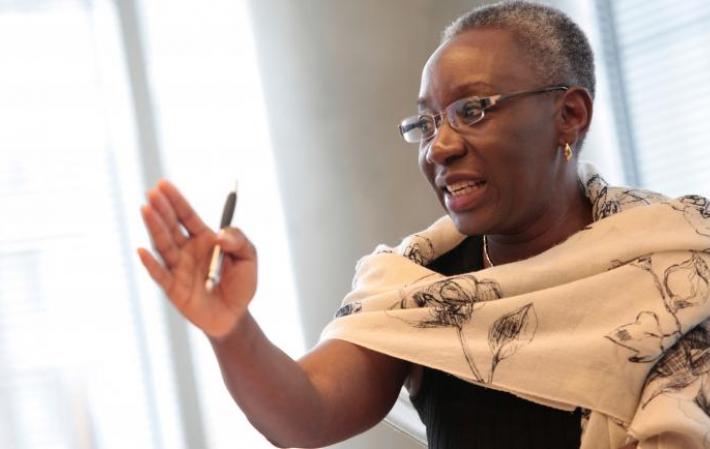
Sandra Pepera, Senior Associate and Director for NDI's Gender, Women and Democracy team.
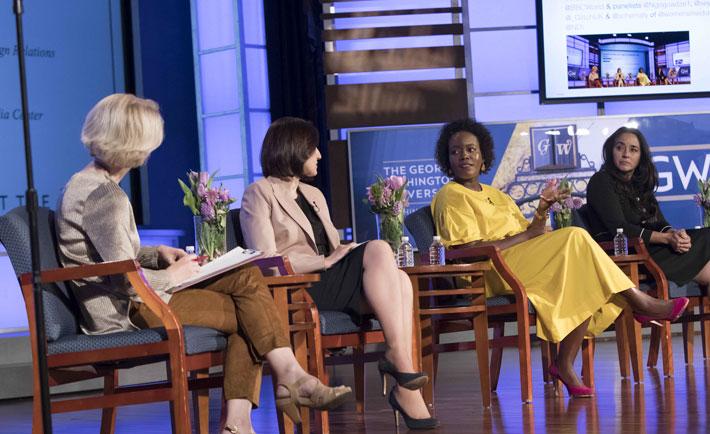
Seyi Akiwowo (second from right) speaking at the #NotTheCost Forum held at the George Washington University titled “Opportunities and Threats Posed by New Media.”
In 2017, after facing horrendous online abuse and harassment when a video of my speech at the European Parliament went viral, I founded Glitch!UK, a not-for-profit online abuse advocacy, campaigning and training organisation. Glitch!UK aims to end online abuse and harassment including online violence against women in politics. ‘Glitch’ means a temporary malfunction with equipment, and I used it for my organisation’s name because when we look back on this period in time I want us all to be able to say that the rise in online abuse and harassment was only a ‘glitch’ in our history. I was asked to be part of NDI’s Internet Governance Forum 2017 panel on the issue of online violence against women in politics, and in the months since then, I have become a public advocate for NDI’s #NotTheCost campaign, participating in three #NotTheCost events in Washington, D.C., in May.
The last few months, we here at NDItech – NDI's technology for democracy team – have had the great opportunity to talk civic innovation, transparency and accountability with dozens of civic groups, journalists and government officials through a set of TechCamps and PeaceTech Exchanges. These programs, put on by the State Department and PeaceTech Lab respectively, link technical experts with innovators across the globe to brainstorm, “pitch” and ultimately bring to life smart, contextualized tech solutions to pressing community problems. It’s been a pleasure for us (your bloggers) to be a part of these sessions, which we wanted to share a bit about with you all (our loyal readers).

Representatives from NDI staff and the NDI Equal Voices Advisory Council with the Equal Rights Association co-Executive Directors Dragana Todorović and Amarildo Fecanji.
“This is a once in a generation opportunity,” declared Dragana Todorović, Executive Director of the LGBTI Equal Rights Association for Western Balkans and Turkey (ERA), during a recent meeting with NDI staff in Washington, DC. The “once in a generation opportunity” Dragana referenced alludes to a shared political entry point for most member groups: the chance to use the European Union (EU) integration process to advocate for greater LGBTI rights and inclusion at the national level. Leveraging this opportunity now could establish mechanisms and norms for LGBTI equality, such as national action plans – new or strengthened legislation and LGBTI CSO visibility in a mainstream political processes – that would have an enduring impact for years to come.
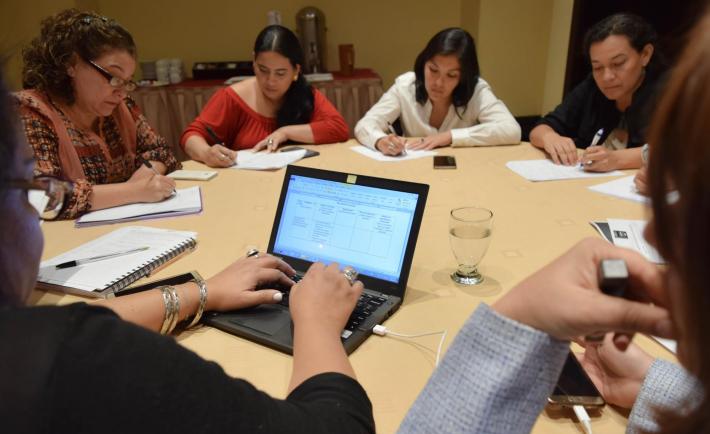
Political party members participate in a focus group to inform the assessment on violence against women in political parties in Honduras.
For NDI and its Honduran local partners, addressing violence against women in politics is critical to promoting strong and inclusive democratic societies. Violence against women in politics is a barrier to their active participation in democratic spaces and limits their ability to lead and be heard by their communities. It is important to place this issue on the political agenda and advocate for legislation to prevent, respond to, sanction and eradicate all forms of violence against women. In an effort to document violence against politically-active women in Honduras, NDI supported the creation of the Women’s Political Violence Observatory during the 2017 electoral process. The Observatory documented and followed 14 cases of violence against female candidates in San Pedro Sula, including Councillor Fátima Mena Baide, throughout the pre-electoral period.

New research is shedding light on why certain people are more susceptible to disinformation and what motivates individuals to choose to join hate campaigns. Photo credit: Dave Haygarth
Disinformation is one of the thorniest problems facing citizens online around the world today. Recent reports have highlighted that the problem is not only present, but indeed it is becoming more grave in the absence of proper solutions to combat it. While considerable thought and research have been dedicated to technological solutions, efforts at understanding the human mechanics of disinformation are still nascent. Exploring what demographics are most vulnerable or most likely to be targeted, why they are receptive to disinformation, and the mechanics of how disinformation spreads within their networks online and offline is key to finding effective solutions in the long term.
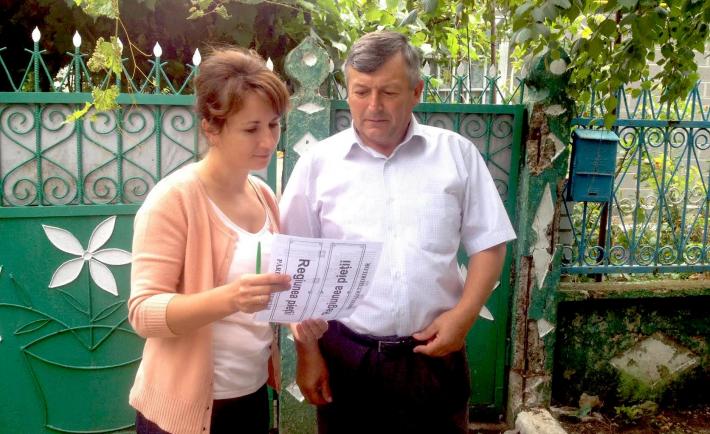
Grassroots party building participant distributes door-to-door questionnaires in Ștefan Vodă, Moldova
Around the world, public opinion polling reveals ever increasing levels of citizen distrust in traditional political parties. This distrust — coupled with fragile party connections with citizens — has increasingly resulted in losses in electoral support to populist forces and social movements that appear to be more responsive to citizens’ concerns. However, government’s ability to meet citizens’ expectations and deliver public goods relies heavily on political parties’ capacity to propose and implement quality, citizen-informed policies. To address these realities, NDI assists political parties to strengthen relationships with citizens, respond to their needs, deliver on campaign promises and improve public welfare. NDI recently concluded research to capture successes and lessons learned in policy development programs across the Institute. Based on this research, here’s some of what we’ve learned:
In recent weeks, Slovakia has experienced massive protests at a scale unseen since the fall of the communist regime in 1989. The protests have been organized throughout the country by young people in their early 20s, many of whom haven’t been engaged politically before. In fact, many of the youth now protesting were born into democracy and barely remember the fight against the authoritarian regime of the late 90s, let alone life under the Soviet-aligned government that came before it. The protests we are currently witnessing, initially fueled by the unprecedented murder of investigative journalist Jan Kuciak, have already resulted in the resignation of the minister of interior and, later, of Prime Minister Robert Fico’s cabinet. While the protests triggered the resignations, civic unrest toward Fico’s cabinet already existed due to accusations of corruption and alleged mafia ties to political elites. However, Slovaks are now demanding Za slusne Slovensko – “Decency in Slovakia” – which means politics clean of corruption, mafia connections and attacks on journalists.
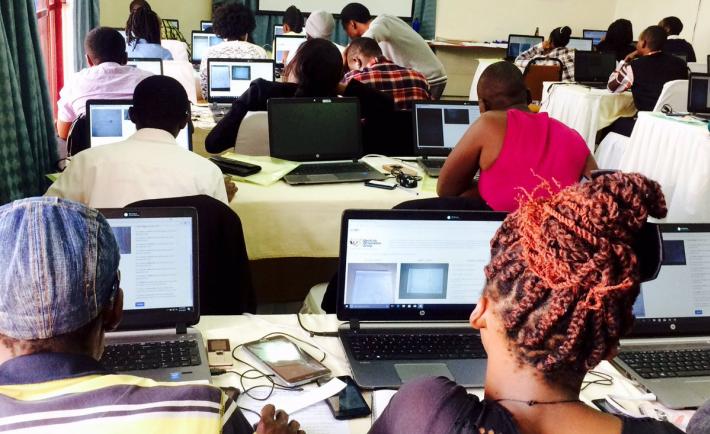
The Election Observation Group (ELOG) in Kenya used a unique data entry tool to match observer-captured images to official election documents
The August 2017 presidential election in Kenya was clouded by accusations of fraud and doubts about the accuracy of results posted on the Independent Elections and Boundary Committee (IEBC) website. Some groups alleged that information from the official polling-station-level presidential results forms (Form 34A) posted on the website may have been altered during the transmission of the forms from polling stations to the national level. The Kenyan Supreme Court’s ultimately annulled the August elections and called for a fresh presidential contest in October 2017. To promote accountability and transparency, NDI provided technical assistance to the Elections Observation Group (ELOG) to deploy 766 observers to polling stations across the country to systematically observe the fresh elections. Election observers were also instructed to take pictures of the completed Form 34As at their polling stations and send the images to the organization through designated WhatsApp numbers to verify the credibility of the data. Five-hundred and forty observers submitted clear photos of the Form 34As from the polling stations. With technical support from NDI, ELOG developed an online system to compare these forms with their official online counterpart.

Rachel Pipan, Allison Price, Tomicah Tilleman and Chris Doten (far right) in on-stage selfie right before their South by Southwest panel “Trust Crisis: The Need for Blockchain.”
Don’t get lost in the technobabble – blockchain is a confusing technology with a simple purpose: enabling groups that don’t trust each other to trade things or validate information without an all-powerful middleman. In a world where trust in institutions, including government, is declining, blockchain provides a useful way to create new systems to empower groups to work together and define what truth is. The blockchain is not synonymous with cryptocurrency, but it is related to cryptocurrency in the same way that the first application of the internet was email.
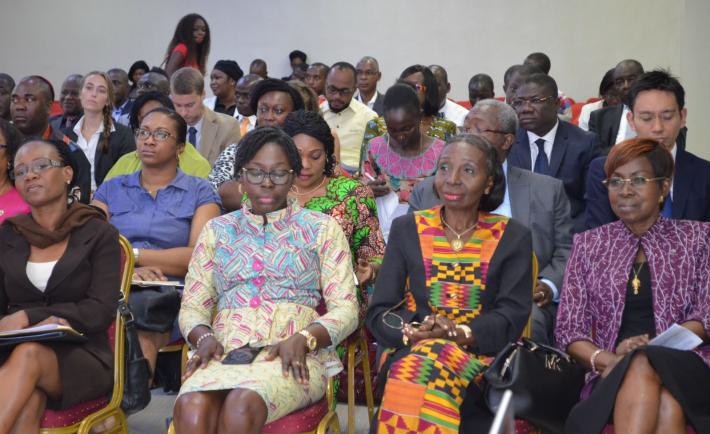
Representatives of Ivorian and international institutions, embassies, political parties and civil society join NDI’s cross-party exchange to discuss key actions that could be taken to address and mitigate violence against women in political parties.
In Côte d’Ivoire, as we have found in many other places around the world, violence against women in politics has long been hidden, unknown, unrecognized, ignored or considered part of the "normal" practice of politics or as the "cost of politics." This is true for women across political sectors, including as voters, candidates, activists and elected or appointed officials. While political parties in Côte d’Ivoire serve as critical pathways for women’s political participation and engagement, including for young or new politicians, they continue to be male-dominated institutions, which allows and enables violence against women in their ranks. Because women believe that speaking out will at best have no real impact, and at worst make their situations worse, the violence women face within political parties has also gone largely unreported.